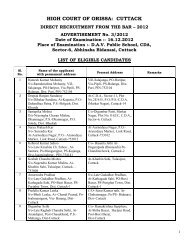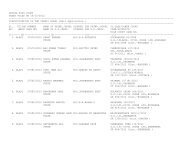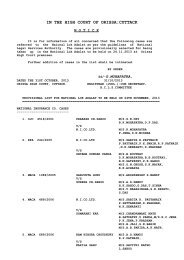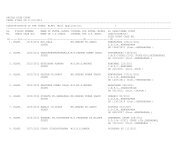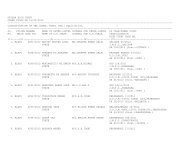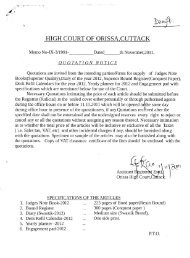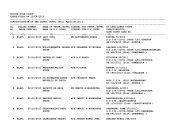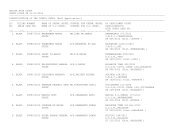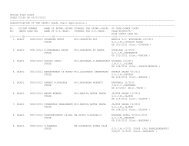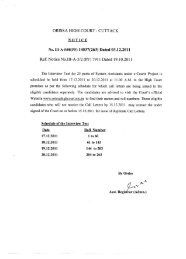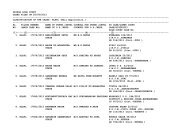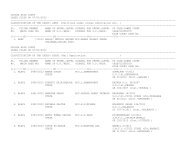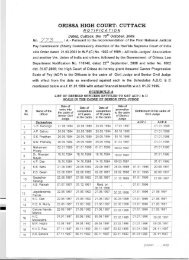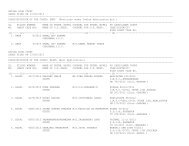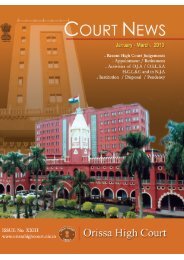ORIGINAL JURISDICTION - Orissa High Court
ORIGINAL JURISDICTION - Orissa High Court
ORIGINAL JURISDICTION - Orissa High Court
Create successful ePaper yourself
Turn your PDF publications into a flip-book with our unique Google optimized e-Paper software.
91<br />
impression of bias and favourtism. In S.G. Jaisinghani v. Union of India<br />
and others , AIR 1967 SC 1427, a Constitution Bench of the Supreme <strong>Court</strong><br />
observed as follows:-<br />
INDIAN LAW REPORTS, CUTTACK SERIES [2010]<br />
“ In the context, it is important to emphasize that absence of<br />
arbitrary power is the first essence of the rule of law, upon which our<br />
whole Constitutional System is based. In a system governed by rule<br />
of law, discretion, when conferred upon Executive Authorities, must<br />
be confined within the clearly defined limits. Rule of law, from this<br />
point of view, means that the decision should be made by the<br />
application of known principle and rules and in general such<br />
decision should be predictable and the citizen should know where<br />
he is, if a decision is taken without any principle or without any rule,<br />
it is unpredictable and such a decision is antithesis to the decision<br />
taken in accordance with the rule of law.”.<br />
9. Applying the law as stated above to the facts of the present case, it<br />
would be found that by drawing a distinction between the candidates<br />
admitted to P.G. (Medical) Course under the State Quota and the<br />
candidates who were admitted to the said course in the All India Quota,<br />
though after admission, they constituted a homogenous class of students<br />
prosecuting their studies in the P.G. Medical Course and withholding<br />
issuance of certificates of P.G. Degree Certificates in case of the candidates<br />
who are admitted under the State Quota , whereas awarding such<br />
certificates to the candidates, who are admitted under the All India Quota<br />
amounts to treating equals as unequals. It definitely results in a situation<br />
where the candidates under the All India Quota after obtaining such<br />
certificate get the opportunity to prosecute Post P.G. Speciality Courses,<br />
immediately, but the candidates admitted under the State Quota have to<br />
wait for two years more for obtaining such certificates and prosecuting<br />
higher studies till they complete the Post P.G., Mandatory service as<br />
contemplated under Clause-20 of the prospectus.<br />
10. It is, therefore, clear that such action on the part of the State is<br />
arbitrary and unfair and does not stand the test of administrative fairness.<br />
Such action is clearly violative of Article 14 of the Constitution of India,<br />
which calls to be quashed. Coupled with the above, it is also found in the<br />
instant case that such a procedure was not adopted prior to the year 2007<br />
by the State Government, where only in respect of in-service candidates<br />
Pre-P.G. service in KBK/Tribal Districts were insisted upon. Action of the<br />
State Government does not also disclose any reason for adopting Clause-<br />
20, as it stands in the prospectus of the yeas 2007 and 2008 which clause<br />
has been challenged by the petitioners. The discrimination is further evident<br />
on a conjoint reading of Clauses - 20.1 and 20.3, which results in a situation



